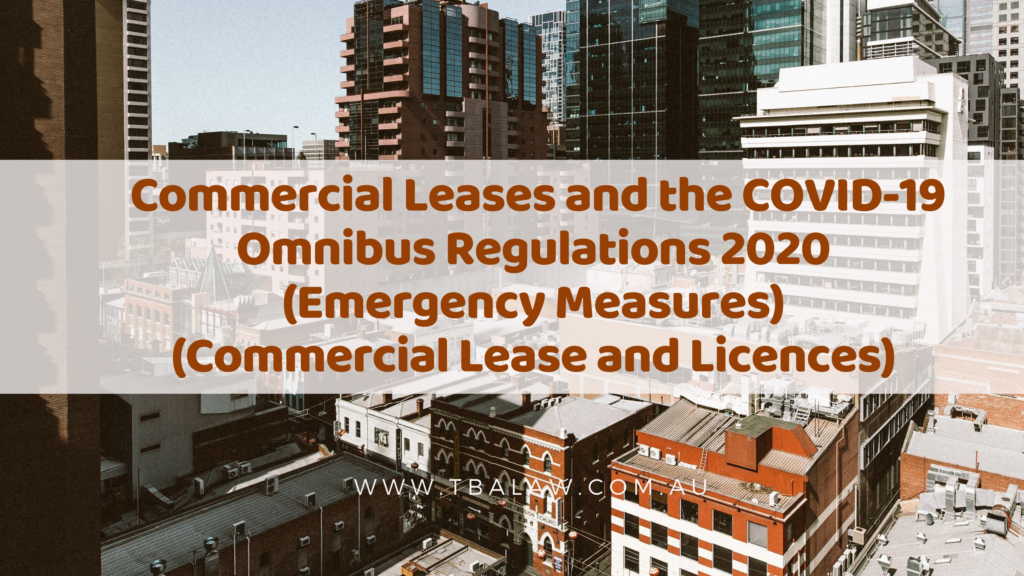Commercial Leases and the COVID-19 Omnibus (Emergency Measures) (Commercial Lease and Licences) Regulations 2020
By Rochelle Manderson
We discussed the Act, now for the Regulations.
To begin with the obvious, there is a current worldwide pandemic due to the outbreak and spread of COVID-19. As previously stated, at TBA law, we have deliberately attempted not to blog topics that may sensationalise the issues or panic public readers about the current situation, however there is information you need to be aware of.

If you are a Landlord, Tenant or business owner, these new regulations may impact or assist you.
Regular readers of this blog will recall our blog discussing the new legislation enacted in direct response to the pandemic by government, called the COVID-19 Omnibus (Emergency Measures) Act 2020, which was enacted into law on 24 April 2020, acts retrospectively from 23 March 2020. The Minister for Small Business has now drafted Regulations pursuant to the Act, being the COVID-19 Omnibus (Emergency Measures) (Commercial Lease and Licences) Regulations 2020, and these may be able to help Tenants or small business owners who are having difficulty maintaining their business through the pandemic. This blog follows on from our last blog discussing the Act.
The legislation has been retrospectively applied from 23 March 2020, and runs to 29 September 2020, unless the government amend this date. We discussed the criteria for a Business to fall within the scope of the Act in our earlier blog, so will not be repeating this criteria here, however where a Tenant’s business meets the requirements of the Act, they may be able to negotiate a form of rent relief. Landlords and Tenants are encouraged to negotiate between each other. Any request for rent relief must be in writing and be as prescribed under s 10 of the regulations, that the Tenant’s lease is an eligible lease and not excluded, and information that shows the Tenant is an SME entity and qualifies for and is a participant in the JobKeeper program.
Parties can agree on a rent reduction, a rent deferral or a rent waiver. A rent waiver will mean you are not required to pay rent for the relevant period, and will not be required to repay this amount once the Pandemic passes or your business improves. A rent reduction will mean you will still pay some rent, however you will not pay as much and you will not be required to pay the difference between your current rent and your reduced rent when the prescribed period of rent reduction concludes. Your third option is a rent deferral, which means you will not pay any rent now, however you will be required to repay the rent you have not paid at the conclusion of the relief period over a set period of time.
- For Tenants, if you can negotiate a rent waiver or reduction rather than a deferral, it will mean you will not be required to pay this amount back. You may need to agree to defer some payment, however try to have a waiver or reduction first;
- It may be worth seeing how much your business has lost, for example if your revenue is down 50%, you could ask for a 50% waiver in rent;
The regulations prohibit Tenants from being evicted for non-payment of rent until 29 September 2020, or the Government legislates otherwise, nor can a Landlord increase the rent during the relevant period. However, you should not look on this protection as permission to not pay your rent. For commercial Leases and Licences, you must fulfil the criteria, and all parties must act in good faith. There are some other regulations regarding Outgoings, trading hours, and Options to renew, however the information most relevant to the majority of business has been outlined above. You should speak with your Solicitor if you believe the other aspects of the Regulations apply to you.
Finally, the Regulations discuss Dispute Resolution. Where Landlord and Tenant are not in agreement, their dispute can be referred to the Small Business Commission for mediation. This is a low cost option for parties to mediate their dispute without large legal fees, although the Regulations expressly allow a party to be legally represented at the mediation (with some exemptions for the mediation to meet with a party without representation). Only where you have attempted mediation through the Small Business Commission and the Commission has certified that the mediation has failed, can you apply to VCAT for a determination of your dispute.
The takeaway for all parties during this difficult time is to be aware of the requirements of the Act and the Regulations, to act in good faith with each other, to both compromise and be reasonable in your negotiations, and attempt to find a solution that will work for each of you. If you cannot do so, there are Dispute Resolution procedures you will be required to follow to resolve your dispute.
Do you need legal assistance? Call us today for a consultation at 1300 043 103 or send an email to admin@tbalaw.com.au.






Leave A Comment